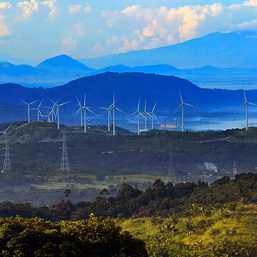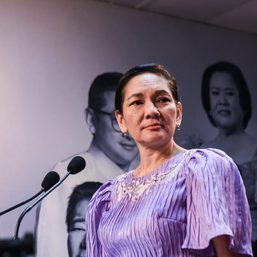SUMMARY
This is AI generated summarization, which may have errors. For context, always refer to the full article.
President Rodrigo Duterte has lifted the moratorium on new mining agreements, a move intended to shore up the pandemic-hit economy.
Duterte signed Executive Order No. 130 on Wednesday, April 14, but Malacañang released a copy of the EO on Thursday, April 15.
The EO overturns a portion of an EO signed by then-president Benigno Aquino III in 2012, which had barred the signing of new mineral agreements “until a legislation rationalizing existing revenue sharing schemes and mechanisms shall have taken effect.”
As there is no such law, Duterte ordered the Department of Environment and Natural Resources (DENR) to do what the expected law was supposed to.
“The DENR shall formulate the terms and conditions in the new mineral agreements that will maximize government revenues and share from production, including the possibility of declaring these areas as mineral reservations to obtain appropriate royalties, in accordance with existing laws, rules, and regulations,” reads Section 1 of the new EO.
The DENR is also ordered to review existing mining contracts “for possible renegotiation” of the proposed terms and conditions.
Meanwhile, the Department of Finance (DOF) is to work with the DENR to implement measures “to rationalize existing revenue sharing schemes and mechanisms.”
Reiteration of environmental policies
The Duterte EO reminded DENR to “strictly implement” environmental policies and rules to ensure mines safety.
While the document does not spell out which acts are considered environmental violations, it specifically told the DENR to implement the measures recommended by the Mining Industry Coordinating Council, which includes mining groups and is co-chaired by the DOF and DENR.
Duterte, in the EO, concluded that the DENR’s review of mining industry regulations was “thorough” and that the agency had put in place enough environmental safeguards.
EO 130 is the Duterte administration’s latest move to lift restrictions on the mining sector following the 2017 closure of 26 mining operations by its first environment secretary, the late Gina Lopez.
In 2018, the MICC reviewed these sites and found that 23 passed in terms of compliance with mining and environmental regulations. That year, the government lifted a ban on new mining exploration. In 2019, 17 more mines were audited.
Though Duterte has repeatedly railed against mining companies for environmental violations and contributing to deadly catastrophes, his EO acknowledged the economic gains from mining.
Thanks to the Tax Reform for Acceleration and Inclusion (TRAIN) law he signed in 2017, the country will get more from mining since the measure doubles excise tax rate on minerals, from 2% to 4%.
Much of the economic potential of mining is untapped, said EO 130, because the country is only mining “less than 5%” of its mineral resources.
The EO even mentions how opening up mining can contribute to the government’s infrastructure program “Build, Build, Build,” and the pet project of Duterte’s longtime aide Senator Bong Go, which aims to send people from Metro Manila back to their home provinces. The program, launched amid the pandemic, introduced COVID-19 to the hometowns of many beneficiaries.
n a statement on Thursday, the Philippine Nickel Industry Association (PNIA) welcomed the lifting of the moratorium, noting the mining industry’s contribution to the economy.
“We remain steadfast in our thrust to adhere to the highest safety standards in our operations and to deliver beyond compliance on environmental safety and protection,” the group said.
‘Profit over healthful ecology’
Groups slammed Duterte’s decision to issue EO 130, saying his government has chosen “profit over a healthful ecology.”
“The legal anchor of EO 130 is Republic Act 7942, or the 1995 Mining Act. But, in fact, this law has proven to be inadequate in many respects,” SOS Yamang Bayan Network, a multi-sectoral alliance of nongovernmental organizations, indigenous peoples, people’s organizations, church-based groups, youth, and artists, said on Friday, April 16.
The group noted in a statement that penalties for environmental violations under the law “are a mere slap on the wrist of mining companies, failing to deter them.”
“Under this law, critical environmental areas have been opened up to mining, prioritizing profit over a healthful ecology,” it added.
SOS Yamang Bayan Network said that the solution should be “a more coherent mining policy that addresses social, environmental, and economic issues related to mining should be pursued,” and pushed for the passage of the alternative minerals management bill pending before the House and the Senate.
Philippine Misereor Partnership Incorporated (PMPI) said in a statement on Friday that Duterte’s issuance of EO 130 just proved that his “past pronouncements and posturing as pro-environment is nothing but lip service,” and that the reasons behind the EO “are unsubstantial and flawed.”
“We deplore this new destructive measure disguising as a move to favor development of people. This measure is short-sighted and fails to reflect on its longstanding impact to our ecosystem and people,” PMPI said.
“There is a firm need for the government, especially environmental agencies, to properly recognize the intersectionality of social and environmental issues anchored in exploitation of nature,” it added.
It noted the “high” poverty incidence in provinces hosting mining operations, and that the Philippine mining sector “does not contribute to government revenue.”
“Moreover, the EO is deceitful. We doubt that the second amendment in the new order requiring strict implementation of mine safety and environmental policies will be implemented and just an icing on the cake to douse off cold water to oppositions and challenges it will meet,” said PMPI.
“We do not believe that the current policies will safeguard the rights of communities, and the integrity of their environment against the onslaught of foreign-capitalized large-scale mining. Our communities are witness to this,” it added. – with reports from Ralf Rivas/Rappler.com
Add a comment
How does this make you feel?






![[OPINION] Rodrigo Duterte and his ‘unconditional love’ for China](https://www.rappler.com/tachyon/2024/04/rodrigo-duterte-xi-jinping-august-2019.jpeg?resize=257%2C257&crop=91px%2C0px%2C900px%2C900px)



![[The Slingshot] Lito Patay’s 4 hours and 38 minutes of infamy](https://www.rappler.com/tachyon/2024/07/Lito-Patay-4-hours-infamy-July-19-2024.jpg?resize=257%2C257&crop=233px%2C0px%2C720px%2C720px)
There are no comments yet. Add your comment to start the conversation.